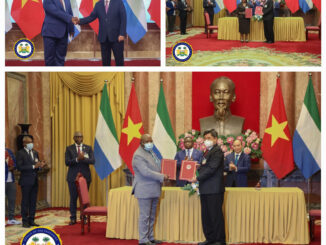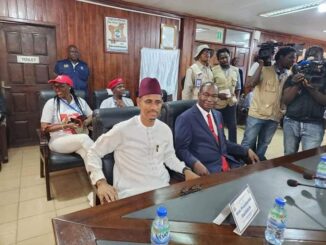Corruption is an obstacle to good governance. It undermines development and is generally an outcome and a symptom of poor governance…where corruption is ingrained and pervasive, especially at the highest political levels, its eradication may require a sustained effort over a protracted period of time. However, the policy of “zero tolerance” should be adopted from the outset, demonstrating a serious commitment to pursue the fight against corruption. (http://www.thecommonwealth.org)
Sierra Leone’s efforts in tackling corruption took a different but positive direction in 2007. Prior to this period, there was the creation of a body to fight this societal and governance peril. But it appeared, there was little or no political will, since the commission had no prosecutorial powers. As such, the effect was continuous thievery of state funds. A Minister of Marine Resource by 2000 was accused of embezzling state funds. He was asked to resign his job with no charges proffered against him. In 2001, a Minister of Agriculture Minister was convicted of embezzling funds from World Bank development funds. He was fined pittance. But there was an interesting development in the case; the judge in charge of the matter and who only fined the convict Le 500,000 (US$250), was in turn convicted of having accepted bribes in trade for the light sentence.
A permanent secretary at the Ministry of Education, a former Transport Minister had a taste of corruption related issues but less or no actions were taken since the ACC was made more to shout and howl than to bite. As a matter of fact, by 2001, independent Freetown based tabloids Democrat and For di People, accused then Justice Minister of accepting bribes in exchange for arranging the release of an Israeli and a Russian held in Sierra Leone, pending extradition to Colombia on drug charges. With no action taken against the Minister at the time, what we witnessed was an act of vengeance since on Nov. 2, 2001, the ACC commenced an investigation on one of the aforementioned newspapers for tax evasion.
Little could be said of the Tejan Kabba (h) regime when it comes to sincerity of purpose as per the creation of the Anti Corruption Act and the provisions therein. Journalist David Tam Baryoh wrote, that “…though President Tejan Kabbah has not yet been directly accused of corruption, he has been slow to order investigations of his political protégés, as in the case of Education Minister Alpha Wurie and Justice Minister Solomon Berewa. Moreover, there are indications that the ACC may be deteriorating into a political tool to track down the president’s detractors…” (http://www.worldpress.org/Africa/352.) Fact remains it was at the peak of corruption during the Kabbah regime, that we saw the British the largest single contributor of aid in Sierra Leone stopped all aid coming to Sierra Leone in 2007.
The Ernest Koroma administration came with the 20008 Anti-Corruption Act which established the ACC as an independent commission to investigate corruption and with prosecutorial powers granted by the 2008 Anti Corruption Act to the commission. Only under the Koroma administration that the ACC ensured the highest rate of prosecution and conviction for corruption related offences in the country’s history, with billions of Leones recovered from persons convicted or investigated for corrupt practices. In just 2010, a total of 199 cases were lodged with the ACC- up from 33 in 2007, when President Koroma was elected. By the same period, a total of $ 2440, 000 worth of stolen funds was recovered.
With efforts to step up prevention, an Anti- corruption System and Process Reviews of government Ministries, Departments and Agencies (MDAs) for the purpose of improving their systems and processes was initiated. Measures to strengthen public financial management in both Central Government and Local Councils have been in place in the last half a decade or so. There has been a comprehensive review of the Government Budgeting and Accountability Act (2005), financial Management Regulations (2007), Public Procurement Act (2004) and Procurement Regulations (2006) to strengthen the legal framework for budgeting, accounting, recording and procurement. There also was the establishment of a Performance Audit Unit in the Office of the Auditor General to go beyond traditional financial audit and appraise and measure the impact of public service delivery on citizens.
All of the above are a clear manifestation of government’s commitment to transparency. The institutional framework has been established and corrupt officials are now chased, devoid of party affiliation, tribe or region one comes from.
In fact by 2010, the Global Corruption Barometer conducted by the Transparency International found that 73% Sierra Leoneans – up from 64% in 2009 believed the country’s effort to fight corruption was effective. The country even moved from 1.9 in 2009 to 2.4 in 2010 in the very Transparency International Index. By 2010, the Global Integrity Scorecard published that among the lower and middle income countries in the world, Sierra Leone achieved important anti-corruption improvements.
It therefore becomes apparently ironical for Transparency International to present Sierra Leone as a nation woefully failing its citizens, when it comes to fighting corruption. It gives one the impression that the study was not only faulty but one that aims at undermining the smooth progress we have been making. Using less than 1,200 respondents as sample for a country with over 5.8 million people brings suspicion in the whole study. Weak sample! And it thus brings into disrupt any conclusion thereafter.
I am not in any way suggesting, the country has achieved her desired goals in tackling corruption. I am aware of the challenges we still have. But there have been sustained efforts and the policy of “zero tolerance” has been adopted from the outset, demonstrating a serious commitment to pursue the fight against corruption.
If not for the purpose of just scooping donor funds, international groups like TI should have been courageous and bold to state t the progress we have made in the last six years of governance. But alas! Not just will I therefore say the outcome of the TI survey is faulty, but one that should beg for more efforts to rethink and reposition their research if they should be trusted in the future.




